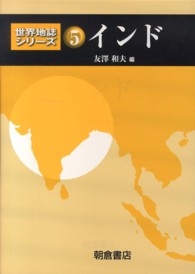基本説明
New in paperback. Hardcover was published in 2008. Presents a comprehensive theory of international law by uniquely applying social-science models and ideas to the field.
Full Description
How International Law Works presents a theory of international law, how it operates, and why it works. Though appeals to international law have grown ever more central to international disputes and international relations, there is no well-developed, comprehensive theory of how international law shapes policy outcomes.
Filling a conspicuous gap in the literature on international law, Andrew T. Guzman builds a coherent theory from the ground up and applies it to the foundations of the international legal system. Using tools from across the social sciences Guzman deploys a rational choice methodology to explain how a legal system can succeed in the absence of coercive enforcement. He demonstrates how even rational and selfish states are motivated by concerns about reciprocal non-compliance, retaliation, and reputation to comply with their international legal commitments.
Contradicting the conventional view of the subject among international legal scholars, Guzman argues that the primary sources of international commitment--formal treaties, customary international law, soft law, and even international norms--must be understood as various points on a spectrum of commitment rather than wholly distinct legal structures.
Taking a rigorous and theoretically sound look at international law, How International Law Works provides an in-depth, thoroughgoing guide to the complexities of international law, offers guidance to those managing relations among nations, and helps us to understand when we can look to international law to resolve problems, and when we must accept that we live in an anarchic world in which some issues can be resolved only through politics.
Contents
1. Introduction
International Law at Work
Methodology
Compliance and Effectiveness in International Law
The Scope of the Book
2. A General Theory of International Law
Games States Play
The Three Rs of Compliance
International Tribunals and State Responsibility
Payoffs and Strategies Over Time
Modulating the Level of Commitment
Coercion and International Agreements
Multilateral Cooperation
3. Reputation
How Reputation is Gained and Lost
Managing Reputation Over Time
The Role of Information
The Compartmentalizing of Reputation
Limits and Caveats
4. International Agreements
Why Do States Make Agreements?
Matters of Form
The Interaction of Form and Substance
The Scope of Agreements
Membership in International Agreements
Conclusion
5. Customary International Law
The Traditional Definition of CIL
Rational Choice Critics
Compliance and CIL
Opinio Juris
State Practice
An Example of CIL: Pacta Sunt Servanda
CIL and Other International Law
6. Understanding International Law
Notes
Bibliography
Index








